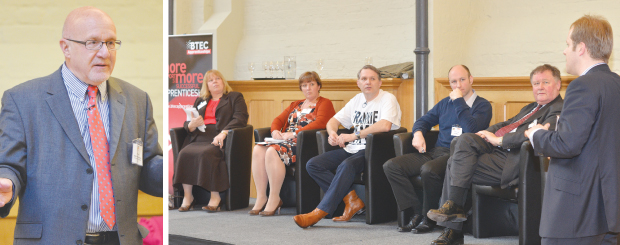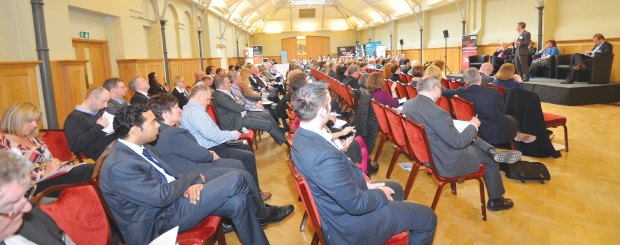Lord Knight of Weymouth gave the opening address | Scott Upton, vice principal of Sandwell College speaks out | Karen Woodward, NAS said quality was illusive
Reinforcing standards, the growth in new adult starts and the ever elusive definition of an apprenticeship was at the heart of the agenda for the last session of the Apprenticeships England conference last week.
The event, organised by Peter Cobrin and Lindsay McCurdy of the popular LinkedIn group ‘Apprenticeships England’, allowed colleges and training providers to voice their concerns about current practice.
Graham Hoyle, chief executive of the Association of Employment and Learning Providers (AELP) reinforced the responses he gave at the Business, Innovation and Skills (BIS) Select Committee evidence session earlier this month, and said the sector couldn’t debate the quality of the programme without settling on a definition of the word ‘apprenticeship’.
“You can’t talk about the quality of anything until you know what you’re talking about,” he said.
“Until we’ve got a very clear understanding of what an apprenticeship is, it’s quite difficult to actually start determining how we get the right quality into it.
“I have to say it’s a really debilitating issue at the present time within the current debate.”
The AELP chief executive said the issues with the programme were “peripheral problems” for the National Apprenticeship Service (NAS) and didn’t detract from “a massive success story”.
Mr Hoyle said: “Why have I not seen anywhere that we’ve got 750,000 apprentices out there?
“When one or two years ago in every city you were still bumping into people on the street saying, ‘shame we don’t have apprentices any more’ – the move in such a short period of time has been absolutely phenomenal.”
Mr Hoyle offered a definition for apprenticeships, consisting mainly of a job, a programme which is employer designed and elements which are independently accredited.
With 76.5 per cent of apprenticeships “ticking those required boxes” the duration of an apprenticeship, Mr Hoyle says, is “broadly irrelevant”.
“Not totally, but broadly, irrelevant,” he told delegates.
Sort them out and I’m the first there with the rifle, but I’m not prepared to come along with a blunderbuss”
“Why are we getting pulled up, particularly about length of duration being the particular quality issue, if all those boxes are properly ticked?”
Mr Hoyle admitted some providers had “clearly pushed the limits” and “crossed the line” in recent months, but advised government to avoid creating a brand new set of rules to combat it
“We’ve found out where they are – sort them out,” he said.
“But don’t do what normally happens in these situations when government money is involved – you set up a brand new set of rules and overlay them on everybody who is actually doing a darn good job.”
He added: “Sort them out and I’m the first there with the rifle, but I’m not prepared to come along with a blunderbuss.”
Nick Linford, managing director of Lsect and managing editor of FE Week, chaired the conference and said it was quite right to call the duration of apprenticeships “the battlefield”.
Mr Linford said: “We now know that from the first of August, all 16 to 18 year-olds have to be at least 12 months.
“Now we can debate whether that’s about quality, but actually that’s probably just as much about raising the participation age as it is about quality.

Peter Cobrin, notgoingtouni, organised the conference, which included (from L-R) Liz Green, OCR, Karen Woodward, NAS, Scott Upton, Sandwell College, Jack Farren Kerr, Pearson, Graham Hoyle, AELP on the panel
“Because of course if you’re doing two levels at less than a year each, they’re not going to be 18 and still participating at the end.”
The conference chair emphasised that as long as the government continued to fund Train to Gain, apprenticeships should not be seen as the only option for adult employees.
“My worry is we assume apprenticeships are the only thing in the workplace and therefore the only option.
“For the adults where you’re not worrying about duration, I would suggest the correct programme might be Train to Gain, which hasn’t gone away even though no-one likes to call it that anymore.”
Scott Upton, vice principal of Sandwell College, spoke out about his frustration with short duration apprenticeships and inappropriate frameworks adopted by training providers.
The senior college leader used the new marketing campaign, launched by NAS during National Apprenticeship Week, to highlight the difference between what the government is promoting as an apprenticeship and a significant amount of delivery in the sector.
There are fewer employers, our apprenticeships are shorter in duration and most of them are at a lower level than some of our international comparisons”
“If you’re running a successful engineering company, you did an apprenticeship, but I bet that your apprenticeship lasted more than 12 weeks,” Mr Upton said.
“I bet your apprenticeship definitely lasted more than seven weeks, five weeks, which young people have been presented to my college with.”
Mr Upton continued by arguing that adult apprentices aged 25 and above were damaging the reputation of apprenticeships.
“I bet also that Joe’s apprenticeship was completed when he was a young lad,” he said.
“Not when he was 30, or 40, or 50, that’s adult training – that is not an apprenticeship, it’s different and it’s polluting the brand.”
The vice principal also suggested implementing a minimum duration for apprentices aged 19 to 24, along with making them fully funded and scrapping all adult apprenticeships aged 25 and above.
“An apprenticeship is for young people, 16 to 24 and you should get the full amount of money for it,” he said.
Karen Woodward, a divisional apprenticeship director at NAS, was also among the panel speakers and agreed there were some problems with the apprenticeship programme.
“There are a whole set of issues around apprenticeships that we still need to reflect upon.
“There are fewer employers, our apprenticeships are shorter in duration and most of them are at a lower level than some of our international comparisons.”
The NAS representative also greed with Mr Hoyle and said more needed to be done to clearly define what an apprenticeship is.
“Quality is elusive but when you see it, you really understand what it is,” she said.
“When you see a fantastic apprenticeship, you could bottle it and want to present it right across the country.”
The event, which was the first of its kind held by the Apprenticeships England group, was a huge success.
The original format, which stripped away PowerPoint prompts and actively encouraged audience participation, gave training providers the chance to hold key stakeholders to account.



